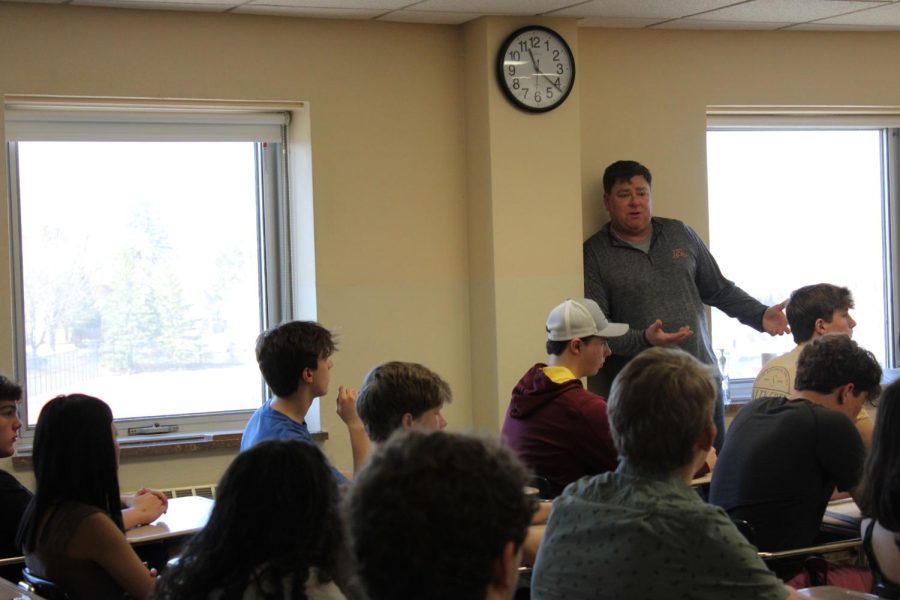Staff Editorial: It’s time to free the APs
Offering Advanced Placement International Diploma shows potential
AP US History and AP Macro/Micro Economics teacher Scott Miller wanders his room during lecture April 12. Miller teaches three of Park’s many AP class options.
April 12, 2023
The International Baccalaureate (IB) program at Park is described as, “‘A program for all students that focuses on how one learns… and creates world citizens who ethically strive to make the world better.’”
Park has been offering the IB diploma program for quite some time, yet people have begun to question whether this comes at the expense of other options. Park doesn’t offer options such as the Advanced Placement International Diploma (APID), which in turn may limit student success and impact their college admissions process. The Echo Editorial Board unanimously agrees that Park should utilize its resources more effectively in order to make college more accessible for students.
The Board acknowledges that there are benefits to Park having an IB program, such as more holistic learning experiences and a chance for honors students to have a more rigorous academic experience. However, the Board worries over the negative drawbacks of solely offering the IB diploma and IB classes. For example, after freshman year, students no longer have the option to take AP science classes and are only offered the IB equivalent. While the Board believes that IB and AP classes offer a similar challenge to ambitious students, the Board is concerned about how well each program transfers into college credits. AP is a more widely accepted program in the U.S., whereas individual IB classes don’t translate as easily into credits because there isn’t a direct college equivalent for each IB course.
Because of this issue, the Board holds that the only kids who reap the full benefits of taking an IB course are the IB diploma students because the diploma translates into credits more often than individual classes do. Knowing this, the Board believes that Park should attempt to offer more AP options to students to allow more chances to receive college credit. The truth is, the cost of college in the U.S. is rising rapidly, and many members of the Board feel or have peers that feel increasingly anxious about affording tuition. Because college is so expensive, many students tend to fixate on ways to reduce their tuition going into college, such as earning college credits in high school to reduce the amount of courses they have to take in college.
The Board holds that offering an AP diploma or more AP classes would help make college more financially accessible for students at Park by allowing them to earn college credits without doing the IB diploma. Though the amount of resources necessary to offer more courses, such as hiring more teachers and paying for more material, would be costly, there are solutions to this issue. A solution to this problem is found in joint-classes. For example, “AP Calculus/IB HL Math Year 1” is a single course currently offered at Park that meets the criteria of both the AP and IB curriculums. Finding a way to offer joint classes, specifically for literature and world language classes, could help students earn college credits easily without inflating the number of courses at Park.
Offering the APID program would offer students a more accessible alternative to the IB diploma program. While Park bases a lot of marketing and courses off of offering the IB diploma, the program itself is lacking. Members of the Board have been interested in the IB diploma coming into Park, but felt that interest quickly dissipate due to the lack of accessible information regarding the program. When students eventually hear about the IB diploma, it’s hard to understand what exactly the program is. Whenever the IB diploma is talked about, most people talk about how “awful” or “hard” it is. Due to a lack of information and a negative stigma, the Board feels that the IB diploma program isn’t accessible. For that reason, offering the APID program would allow Park to give students a more accessible rigorous diploma option.
It’s important to note that Park offers opportunities to gain college credits in accessible programs such as its flourishing PSEO system. However, offering more AP classes will not only allow students to get credits at Park itself, but also increase the impressiveness of their transcript — which may lead to more merit aid from colleges. The Board unanimously believes that Park has a duty to utilize its resources in an attempt to make college more accessible financially and admission wise for its students. One easy way to achieve this action is to offer the APID program and the extra AP classes that come with the program.



